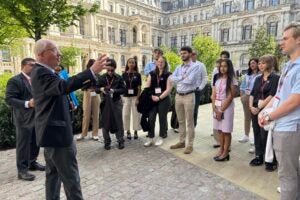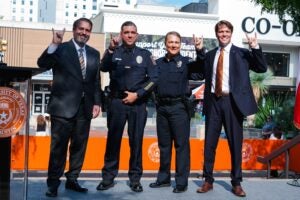David Grosvenor always fantasized about making a war movie but didn’t think it would ever happen until the moment he heard the story of how his father survived World War II with the help of rescuers in Belgium.
From the moment he heard the story it wasn’t a question of if he would make a movie, it was when the shooting would begin.
The award-winning “Last Best Hope: A True Story of Escape, Evasion and Remembrance,” follows pilot Bill Grosvenor “as he retraces his steps and reunites with the people of Belgium who chose to wage a secret war against Hitler through their efforts to harbor and repatriate him and other Allied airmen who were stranded within their borders,” the film synopsis says.
The film is the recipient of eight national and international awards. Most recently, the Belgian government honored executive producers Grosvenor and Ramona Kelly, director/writer/editor Mat Hames and director of photography Wilson Waggoner.
His Royal Majesty King Albert II bestowed the decoration of Knight of the Order of the Crown on the four filmmakers. Admiral Willy Temmerman, military defense attaché to the Embassy of Belgium in Washington D.C., presented the decorations to the filmmakers during a program and screening of “Last Best Hope” at the Pritzker Military Library in Chicago on Oct. 15.
The film has strong ties to the university. Waggoner, Grosvenor and Kelly are alumni of the university. Kelly is associate director for development at the Center for American History and Grosvenor is manager of graphic services in the Division of Continuing and Innovative Education.
Waggoner and Hames are partners in the Austin film production company, Alpheus Media, Inc., which produces State of Tomorrow for the UT System. KLRU-TV was the project’s presenting station to PBS and the Center for American History was among the list of entities that supported the film.
It’s with this support and a little luck along the way that the film came together to tell Bill’s story and the heroic tale of a group of Belgians who jeopardized their own safety to help him and others.
“Bringing this story to light gave us the opportunity to honor ordinary Belgians who acted with extraordinary courage,” Kelly said.
Growing up, Grosvenor heard bits and pieces of his father’s war stories, but it wasn’t until 1998 when he got a copy of a recording of an interview Bill did with a friend that he was able to hear the entire account. What Grosvenor heard blew him away.
“I heard bits and pieces of it growing up but it seemed like another world, it didn’t quite register,” Grosvenor said “Listening to the cassette was the first time I had heard it in one continuous story. I was stunned.”
He immediately played it for Kelly.
“We looked at each other and said ‘we’ve got to make a film,'” Grosvenor said
The documentary shows how the selfless acts of Bill’s rescuers helped him stay ahead of the Gestapo for seven months in 1943 and 1944 after his plane crashed until his “eventual arrest and incarceration in a brutal Nazi prison in Brussels.”
Revisiting the prison was a defining moment in the film and for Bill, Grosvenor said.
“We knew there was a possibility that he would freeze up and not talk but he didn’t and really faced up to a dark time in his life,” Grosvenor said. “He blew out the cobwebs and put a lot of emotions to rest that he had inside.”
Another key moment was locating and excavating Bill’s plane. Grosvenor said the Belgian Aviation Historical Association had tried for years to get access to the plane, located on private property, with no luck. The landowner finally relented, giving filmmakers the opportunity to gather some of their earliest footage in Belgium.
“Dad was like a kid in candy store,” Grosvenor said.. “He brought back his seat belt because it was the last thing he touched before he bailed out.”
The plane’s engine, radio, oxygen tanks and other items are displayed in a museum in Belgium.
Interviews with Bill’s rescuers and Resistance fighters are also a focal point of the documentary.
Kelly said the number of people involved in Bill’s story they we were able to track down and interview was surprising.
“When we started talking about the project in the summer of 2000,” she said, “David and I never dreamed of the scope of the story we were about to tell. We knew that Bill had crashed and was on the run for seven months before he was captured and imprisoned. That information and the remains of a dog-eared address book were really all we had. The longer we researched the story, the bigger it became.”
One of the people they found was Marcel Harnie, the man who found Bill after his plane went down.
“He took him to Brussels and they were in hiding together,” said Grosvenor, who explained that the man was also hiding because he was avoiding being forced to be a part of the war.
“He spoke English very well and has a remarkable memory. He remembers the number of the street car and the route they took to Brussels,” Grosvenor said of the invaluable interviews with Harnie they were able to include in the film.
“The people we interviewed for the film were humble and modest and always downplayed their acts of heroism,” Kelly said. “But they all spoke with passion and conviction about their motivation. As resistance fighter Nadine Dumont explained, ‘We fought for freedom. For freedom.'”
Kelly said helping tell the stories of the courageous people she met was the greatest privilege of her life.
“‘Last Best Hope’ is a story about dad but also about Belgium, their story and history,” Grosvenor said. “I always thought Belgium would be our biggest critic and that they thought we got the story right means a lot. Being knighted means something to me because we really did get it right.”
For more information on the film go to http://www.alpheusmedia.com/lastbesthope/home.html.



